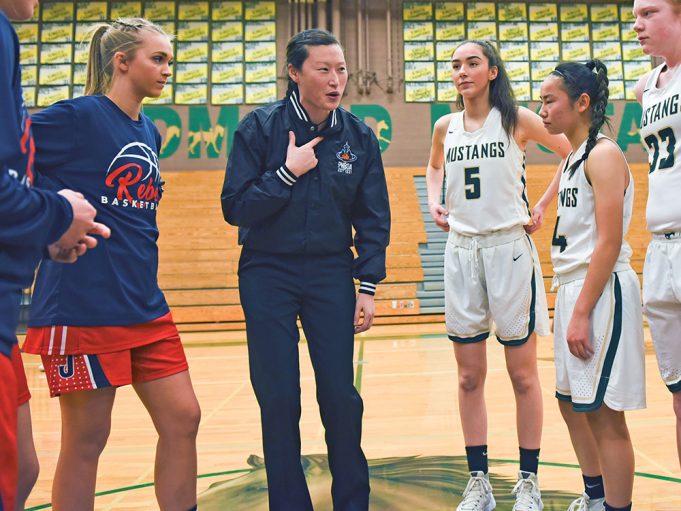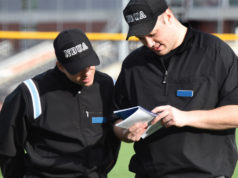Have you ever worked with an official from a different level? Maybe you are a well-established high school football referee and once in a while a D-I official joins the crew for a few games. Sure, it makes for competent officiating and even greater networking, but is it a good idea for the officials moving down a level? Is there a risk of breeding resentment into an often already assignment-obsessed profession?
When is it a good idea for an official to jump between different levels? When it is a bad idea? And how do you make it work for both the person making a visit down to a lower level, and for the hard-working lower-level referees who have to welcome an outsider to their game?
For the people involved — the supervisors, the officials coming down and the referees whose assignments are potentially threatened — there are many variables to keep in mind.
Mark Uyl, the Executive Director of the Michigan High School Athletic Association and a D-I baseball umpire, spends time considering the positives and negatives of particular assignments for state tournament games.
“We want the very best officials doing our games,” Uyl said. “We see using officials from higher levels as a positive thing and I think it is a tremendous asset. Those officials are getting more reps at a higher level of the game.”
Uyl believes it is about competence and making sure the game is officiated in the fairest way possible using those with the most experience who have proved themselves over time. He is not alone in taking that approach.
Tony Steratore is an NFL back judge who worked his way up to get where he is today. He’s been in the most important games at his sport’s highest level. For him, the situation is clear.
“The immediate need is to get the best people on the field,” Steratore said. “That’s a fundamental point and it is about what is best for the game.”
The fairness of the game does need to be paramount, but the development of young officials is also something that is crucial to every sport. Promising referees need to be cultivated and given the opportunity for seasoning so they can go to that next level. For some referees, that means getting as many reps as possible on any level they can.
“From a basketball standpoint, it is important for young officials to get as much experience as possible,” said John Cahill, Big East’s supervisor of men’s basketball officials. “I think going to do games at different levels is a positive and it keeps the young officials sharp and growing.”
Many supervisors feel it is positive for officials to work varying levels of play, but it is important how it is done. If a former MLB umpire came to a high school championship without doing a regular season high school game all season, or in years for that matter, that would certainly call into question not only his familiarity with the specifics of the high school game, but also the fairness of the assignment. It is a situation that Uyl is cognizant of and one for which he provides safeguards.
“All of our officials have to have a minimum number of games to qualify for the postseason,” Uyl said. “Having said that, officials may do more games during the year but that doesn’t mean they will get the postseason assignments. If a college official gets his or her minimum requirement of games in, then that official qualifies for the postseason. Like I said, we want the best out there.”
It may be the best-case scenario to have the most experienced officials assigned to games, but working at different levels does bring with it some considerations, concerns and even disadvantages. The obvious consideration is that there are differences in rules at different levels and it may be challenging to keep track of those differences, particularly in the heat of game action.
“There’s no question that there are some disadvantages. If an official is working a freshman boys’ game on Monday, a girls’ varsity game on Tuesday, a boys’ varsity game on Wednesday and a D-I college game on Thursday, that is not only a hard schedule … (but) four different game-pacing styles to keep track of,” Uyl said.
Getting reps is one thing; getting the “right” reps is another
Getting your reps is one thing, but getting the right type of reps is another. Sure, you may want to stay sharp, but if you’ve risen to, say, a varsity level, how much is there to be gained, other than a pay day, by going back to middle school?
Bob Delaney, NBA Referee Operations vice president and director of officials, works with the very best officials in basketball. It is his job to help see that they are at their best. The principle of more being better isn’t something with which he necessarily agrees.
“From my view, when you look at refereeing at widely different levels, like say D-I and high school freshmen basketball, that’s quite a width. I would not encourage officials to make a habit of that practice,” Delaney said.
Do your Best Wherever you are Assigned
Your goal should be to do your best wherever you are assigned. It becomes important to stay aware of your limitations as an individual. Bouncing up and down between levels can be cause for concern.
“Once you’ve established yourself at a certain level, it can very difficult to adjust back to high school,” Cahill said. “The rules are different and there is a lot to keep track of. The athletes are bigger, faster and quicker and the degree of physicality is different.”
Part of the concern is simply the rules and part is the physical development at different levels, but there is something else that supervisors worry about. It is about what goes on inside the official when they work many, many games.
“It is very hard for officials, not so much for the style of play, but because of your mental state,” Cahill said. “Mentally too many games take a toll. You may be able to get adequate physical rest but you can get worn down mentally. Then you have to wonder if you’re sharp enough to make the tough calls.”
There’s also an often unspoken concern. When you go between different levels, it would be human nature to value the higher-ranked game over the lower-ranked game. You’d be hard pressed to find someone to admit that, but let’s face it, if you’re officiating Michigan and Ohio State on Saturday and Ann Arbor High on Friday night, which game are you going to try to be extra sharp for?
“I’ve done college games on Saturday and high school games on the same Friday,” Steratore said. “Many officials do this, but I have to tell you something, if you’re going to do this, you have to bring your A-game to Friday night as much as you bring it to Saturday. If you don’t, you’re doing the game and yourself a disservice. When it comes down to it, if you can’t guarantee both games are getting equal attention, then you have to choose one or the other.”
Steratore added that the Friday night high school game might even bring more pressure because of your drive to do right by the game. Added pressure isn’t always best for an official, especially for one who should be getting a good night’s rest on a Friday night before a game that will be watched by half of the world.
For an assigner, there is also the very serious disadvantage of discouraging your base of hard-working officials who have been with you all year. It is natural to get disappointed when your goals are thwarted, especially if you think it has been done unfairly.
“We occasionally hear some grumbling, but we want the best out there,” Uyl said. “If an official meets the requirements, then we don’t hesitate to appoint them.”
Have Minimum Requirements in Place
Having that minimum requirement in place circumvents much of what could cause the problem of negativity among other officials. Not getting the assignments you want, or even think you deserve, is something all officials have to deal with. It comes with the territory and if you allow it to eat you up on the inside, then it will affect you as an official.
“It is important to the development of an official to have the mindset that if you’re good enough, what you want will come,” Steratore said. “Obsessing on assignments can be a real distraction and you wind up expending energy on that instead of developing yourself as an official. Put your focus into getting the calls right, not what assignment you are getting or not getting.”
There’s a lot that goes on off the court or the field that goes into being an official. Managing your emotions, not just about tough calls, but about issues away from the game, is just as important in your success.
“Dealing with disappointment about assignments is, in and of itself, a developmental issue,” Steratore said. “You have to realize you are not going to get every assignment and not let it consume you.”
Humility is an essential part of being a complete official and it is something higher-level officials visiting lower levels need to keep in mind. Showing up for a high school assignment in college gear is bad form and it sends the message about who you think you are. No one likes to feel like they’ve been big-timed and wearing the higher-level gear isn’t going to get you off on the right foot.
Act as a Role Model
There are, however, wonderful opportunities to act as a role model instead of a big shot. Officiating at different levels can give officials a chance to give back to the folks who are where they used to be.
“The best opportunity is for the younger officials to see how someone with more experience handles situations and how they communicate,” Uyl said. “So much of being a great official is being able to handle people and if you can do it at the college level with all the fans and the TV, then you can do it at the high school level. That’s great for our younger officials to witness.”
The little interactions away from the action can also prove to be valuable. Young officials sometimes need someone to share their insecurities with and they need to hear an encouraging word from someone.
“Experienced officials can be there when you’ve had a tough game to let you know you’re going to be all right,” Cahill said. “They can also be there to warn you not to get overconfident when you’re riding high.”
Giving back can happen on the court or field — or off. If you want to give back, know that you can do it by officiating, but you can also do it by being a presence to help out at clinics and training or evaluating.
“I think sometimes you might be better off watching the game and offering constructive feedback rather than by being part of a crew of a game at a different level,” Delaney said.
What's Your Call? Leave a Comment:
Note: This article is archival in nature. Rules, interpretations, mechanics, philosophies and other information may or may not be correct for the current year.
This article is the copyright of ©Referee Enterprises, Inc., and may not be republished in whole or in part online, in print or in any capacity without expressed written permission from Referee. The article is made available for educational use by individuals.



















